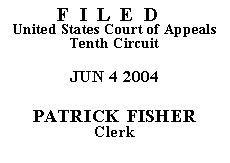

|
WILFRED D. MARQUES,
v.
WARDEN ABBIOT, C.T.C.F.;
PEOPLE OF THE STATE OF
COLORADO; ATTORNEY
GENERAL OF THE STATE OF
COLORADO |
|
Before EBEL, MURPHY, and McCONNELL, Circuit Judges.
This matter is before the court on Wilfred D. Marques' requests for a certificate of appealability ("COA") and to proceed on appeal in forma pauperis. Marques seeks a COA so that he can appeal the district court's dismissal without prejudice of his 28 U.S.C. § 2241 habeas corpus petition.(1) See 28 U.S.C. § 2253(c)(1)(A) (providing that no appeal may be taken from a "final order in a habeas corpus proceeding in which the detention complained of arises out of process issued by a State court," unless the petitioner first obtains a COA). Marques' request to proceed before this court in forma pauperis is granted. Furthermore, because this court concludes that this case is in need of further proceedings, Miller-El v. Cockrell, 537 U.S. 322, 336 (2003), we issue a COA in this case. Exercising jurisdiction pursuant to 28 U.S.C. §§ 1291 and 2253, this court reverses the district court's dismissal of Marques' § 2241 petition without prejudice and remands the matter to the district court to dismiss the petition with prejudice.
The district court dismissed Marques' § 2241 petition without prejudice on the ground that Marques had not exhausted his state court remedies. In seeking reversal of this dismissal on appeal, Marques appended to his appellate brief documents filed in state court proceedings. Not only do those documents make clear that Marques has, in fact, exhausted this claim in state court,(2) they also led this court to discover that the instant § 2241 is identical to a previous § 2241 petition filed by Marques. In Marques v. Burnett, 62 Fed. App. 247, 248 (10th Cir. 2003), this court noted that Marques was challenging a method of calculating sentencing credits that Colorado officials adopted in 1990. The district court had denied Marques' petition, construed as arising under § 2241, on the ground that it was untimely pursuant to 28 U.S.C. § 2244(d)(1). Id. This court denied Marques a COA, concluding the district court was correct in determining that Marques' § 2241 petition was untimely. Id. at 248-49. Our review of the record and Marques' appellate filings in this case reveals that the issue Marques seeks to raise is identical to the issue disposed of in Marques v. Burnett.
In light of the successive/abusive nature of the instant § 2241 petition, this court REVERSES the district court's dismissal of Marques' petition without prejudice and REMANDS the matter to the district court to dismiss the petition with prejudice. See generally McCleskey v. Zant, 499 U.S. 467 (1991) (discussing generally abuse of the writ). On remand, the district court should consider whether filing restrictions are appropriate in light of Marques' history of filing identical § 2241 petitions in rapid succession.
ENTERED FOR THE COURT
Michael R. Murphy
Circuit Judge
*. This order and judgment is not binding precedent, except under the doctrines of law of the case, res judicata and collateral estoppel. The court generally disfavors the citation of orders and judgments; nevertheless, an order and judgment may be cited under the terms and conditions of 10th Cir. R. 36.3.
1.Although Marques styled his habeas petition as a § 2254 petition, the district court correctly concluded that the petition was actually a § 2241 petition because it challenged the execution of Marques' sentence. See Montez v. McKinna, 208 F.3d 862, 865 (10th Cir. 2000) (distinguishing between § 2241 and § 2254 petitions); see also Marques v. Burnett, 62 Fed. App. 247, 248 n.1 (10th Cir. 2003) (construing earlier petition raising virtually identical claims as a § 2241 petition).
2.Marques attached to his appellate brief the first page of a brief filed by the Colorado Attorney General's Office in Colorado district court. Marques asserts that the state case involved the exact same claims at issue in the instant appeal. The Attorney General's brief asserts that Marques has "repeatedly been denied relief when asserting these same claims in both federal and state court." It further indicates that these exact same claims have been raised and rejected in federal court. As set out below, that assertion is correct.